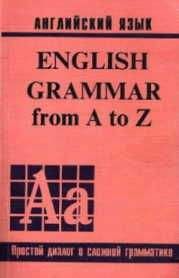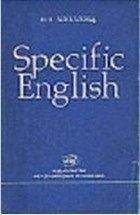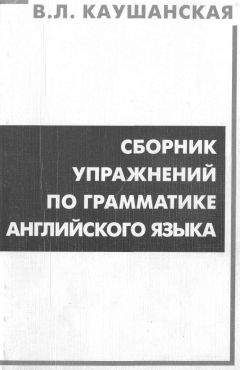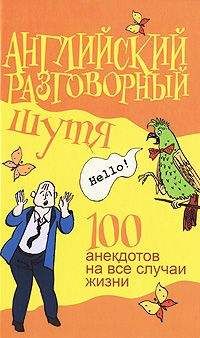Джина Каро - Английский для наших

Скачивание начинается... Если скачивание не началось автоматически, пожалуйста нажмите на эту ссылку.
Жалоба
Напишите нам, и мы в срочном порядке примем меры.
Описание книги "Английский для наших"
Описание и краткое содержание "Английский для наших" читать бесплатно онлайн.
Это издание уникально. С первых же страниц вы заметите, каким простым и приятным может стать изучение английского языка. И мы надеемся, что с помощью наших книг вы сможете самостоятельно его освоить.
3. Two of Us byThe Beatles.
4. Penny Lane by The Beatles.
Упражнения
Постарайтесь найти ошибки и исправить их.
1. "Help to me!" she screamed. "I need in your help! Help to me to go away from here. to go to home! Help me!"
2. "Look on yourself," he snapped. "You look like as a drunken hooker. If you go in the restaurant with this makeup on, everybody will laugh upon you. And what's more, they'll laugh at me, too."
3. I already said you. I am not going to wait you any longer. If you want to stay home, I'll go to there without you.
4. "She is wearing in a pretty evening gown," his wife said. "When are you going to earn enough to buy for me something like this?"
5. I don't think you are really going to follow his example. I doubt in it. You may not pay attention at my words, but I'm telling to you I'm right.
6. When she comes at home late, they go in bed right away, they don't play in cards, they don't even listen to the radio.
7. "Join to us," he said, smiling charmingly on poor Mrs Robbins. "Follow after your sisters. Give us your money. Someday you're going to need us, and we will help for you."
8. "I ask for you to forget me," he said in a trembling voice. "I know I'll miss about you, and you'll never miss me. Someday, maybe soon, you'll meet with another man, and he will make you happy. Look at me - I have nothing to tell to you."
9. Now he's looking for a job. because he doesn't want to depend of his father any longer. He goes to different places, and everywhere they tell him to come next week.
10. "What happened with your sister?"
"Oh, she wants to get married, but nobody pays attention to her, although she wears all those weird clothes and wild makeup."
"But she looks like a whore."
"Yes, but she thinks she looks tike on a princess. She is waiting for a charming prince, you know."
"Oh, I doubt her chances."
11. "Nothing is going to happen to her," he said reassuringly. "Listen me. She met a nice, decent man, she asked him for help, and he was ready to give to her it. We shouldn't discuss about her behavior now, it's too late, anyway. Let's discuss her future instead."
12. "Where are my papers?" he shouted. "I can't look for after them any more! I can't depend on those lazy morons of servants any longer! My patience is over. 1 can't play these games anymore, I'll go away and join the army!"
The Keys
Стр. 194
Предлоги, которые в первоначальных предложениях стояли правильно, выделены и подчеркнуты. Неправильные предлоги зачеркнуты, и вместо них вставлены жирные правильные или, если глагол не требовал предлога, вставлен жирный восклицательный знак в скобках.
1. "HelpTO(!) me!" she screamed. "I need IN(!)your help! Help TO (!) me to go away from here, to go TO (!) home! Help me!"
2. "Look ON at yourself," he snapped. "You look like AS (!) a drunken hooker. If you go IN to the restaurant with this makeup on, everybody will laugh UPON at you. And what's more. they'll laugh at me, too."
3. I already SAID told you, I am not going to wait for you any longer. If you want to stay home, I'll go TO (!) there without you.
4. "She is wearing IN (!) a pretty evening gown." his wife said. "When are you going to earn enough to buy FOR (!) me something like this?"
5. I don't think you are really going to follow his example. I doubt IN (!) it. You may not pay attention AT to my words, but I'm telling TO (!) you I'm right.
6. When she comes AT (!) home late, they go IN to bed right away. they don't play IN (!) cards, they don't even listen to the radio.
7. "Join TO (!) us," he said, smiling charmingly ON at poor Mrs Robbins. "Follow AFTER (!) your sisters. Give us your money. Someday you're going to need us, and we will help FOR (!) you."
8. "I ask FOR (!) you to forget me." he said in a trembling voice. "I know I'll miss ABOUT (!) you, and you'll never miss me. Someday, maybe soon, you'll meet WITH (!) another man, and he will” make you happy. Look at me —1 have nothing to tell TO (!) you."
9. Now he's looking for a job, because he doesn't want to depend OF on his father any longer. He goes to different places, and everywhere they tell him to come next week.
10. "What happened WITH to your sister?"
"Oh, she wants to get married, but nobody pays attention to her. although she wears all those weird clothes and wild makeup."
" But she looks like a whore."
"yes, but she thinks she looks like ON (!) a princess. She is waiting for a charming prince. you know."
"Oh, I doubt her chances."
11. "Nothing is going to happen to her," he said reassuringly. "Listen to me. She met a nice, decent man, she asked him for help, and he
was ready to GIVE TO HER IT give it to her. We shouldn't discuss ABAUT (!) her behavior now, it's too late, anyway. Let's discuss he
12. "Where are my papers?" he shouted. "I can't look for AFTER them any more! I can't depend on those lazy morons of servants any longer! My patience is over. 1 can't play these games anymore, I'll go away and join the army!"
Упражнения
А теперь сами вставьте предлоги (если нужно).
1. She asked... me... help... her, but 1 didn't pay attention... her request, and only laughed... her.
2. He tells... her he will miss... her, but she doubts... his words.
3. If you listen... me and follow... my advice, nobody is going to laugh... you.
4. They are playing... cards, drinking wine and discussing... their problems at the same time.
5. She looked... his pale face and smiled... him. Then she said, "I am ready to helpf.-you if you really need... my help."
6. "Listen... me," he said. "If you don't want to look... an idiot, you shouldn't join... this organization."
7. I am waiting... her because she promised to come... here.
8. She is looking... her black hat, but she can't find it anywhere. If she doesn't find it. she can't go... the party. Without the hat, she is going to look... a scarecrow.
9. "A strange thing happened... me," he said. "I met... a gypsy girl who told... me all about my fate. I wanted to give... her all my money, but she didn't take it."
10. "I wouldn't like to depend... you." he said coldly. "Although you're wearing... this police uniform, you don't look... a policeman. You don't even look... an honest man. You don't look... trustworthy."
11. I meet... her at the same crossroads everyday. She constantly wears... the same black stockings and red skirt. I think she waits... somebody. But 1 never tried to follow... her.
12. If he absolutely wants to play... violin, I can give... him my own violin. But I doubt... the firmness of his decision. If he needs... something, it's a guitar, not a violin.
Cтp.195
1. —, to, —, to, at. 2. —,—,—.
3. to, —, at.
4. —,—.
5. at, at, —, —.
6. to, like, —.
7. for, —.
8. for, to. like.
9. to, —, —. —.
10. on, —, like, like, —.
11. —, —, for, —.
12. —, —, —, —.
4.2. Предлог плюс обстоятельство
Now that I was getting close, there was an almost ungovernable urge to hurry, to get it over with. But if I hurried, I would die. So I forced myself to go slowly.
Stephen King, The LedgeОбстоятельство- это такой член предложения, который не зависит от глагола. Например, "Я слушаю радио на кухне". "Радио" - это дополнение, оно зависит от глагола и присоединяется с помощью именно того предлога, которого требует глагол: слушать кого-то, что-то - to listen to smb/ smth, следовательно, I am listening to the radio.
А вот какой предлог мы поставим перед "кухней" - это не зависит ни от какого глагола, а только от самой кухни. Уж какой предлог принято ставить перед кухней, такой и нужно ставить.
Перед кухней принято ставить предлог in:
I am listening to the radio in the kitchen.
Итак, выше мы рассматривали дополнения, и они вводились тем предлогом, которого требовал глагол. А теперь мы будем рассматривать обстоятельства, и они будут вводится теми предлогами, которых требуют они сами. Здесь же мы, кстати, рассмотрим и прочие затруднительные предлоги, которые не зависят от глаголов.
1. near
Когда студент X, по обыкновению, переводит то, что он хочет сказать, с русского языка, у него получается:
I live near from the bus stop. Я живу недалеко от остановки автобуса.
It's near with my house. Это рядом с моим домом.
I work nearly from here. Я работаю близко отсюда.
Часто также (по причине необъяснимой) он ставит после near предлог of:
We'll place the bookcase near of the desk.1
1. Это можно объяснить только в случае, если студент Х предварительно изучал, например, французский язык. Если это действительно так, то пусть он запомнит: в английском языке предлог "near" ведет себя не так, как французское "pres de".
Все это не соответствует действительности. Есть два варианта использования этого предлога: просто near (и дальше сразу обстоятельство, без всяких лишних предлогов) или near to (и дальше обстоятельство):
I live near (to) the bus stop.
It's near (to) my house.
I work near here.
We'll place the bookcase near (to) the desk.
Как вы заметили, только в одном из этих примеров нельзя поставить to после near. Почему? Чем отличается here от the bus stop или ту house?
Мы уже сталкивались с подобной ситуацией, когда речь шла про глаголы to go и to come. Конечно же, here - это наречие, поэтому перед ним мы to не ставим.
Слово nearly - это вообще не предлог, это наречие, означающее "почти" (или, в некоторых случаях, "чуть не"). Предложение I work nearly here означало бы "Я работаю почти здесь". (А предложение I nearly fell off the bike - "Я чуть не упал с велосипеда" .)
Примеры:
Peter Brown called to say, you can make it OK. You can get married in Gibraltar near Spain.1
I'm a loser And I lost someone who's near to me.2
Let me sleep all night in your soul kitchen Warm my mind near your gentle stove.3
"Doctor, I am sorry to drag you so far out in the country on such a bad night," "Oh, it's all right because I have another patient near here so 1 can kill two birds with one stone."
И для сравнения:
I nearfy died'cause you walked hand in hand With another man in my place.4
1. The Ballad of John and Yoko ByThe Beatles.
Подписывайтесь на наши страницы в социальных сетях.
Будьте в курсе последних книжных новинок, комментируйте, обсуждайте. Мы ждём Вас!
Похожие книги на "Английский для наших"
Книги похожие на "Английский для наших" читать онлайн или скачать бесплатно полные версии.
Мы рекомендуем Вам зарегистрироваться либо войти на сайт под своим именем.
Отзывы о "Джина Каро - Английский для наших"
Отзывы читателей о книге "Английский для наших", комментарии и мнения людей о произведении.






















